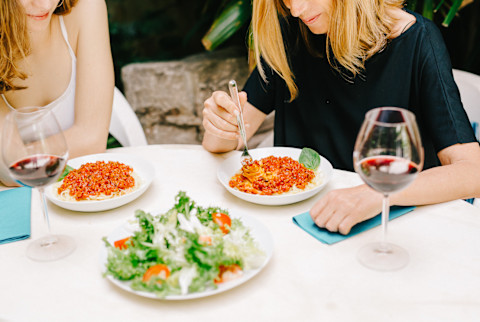How To Transition From Dieting To Intuitive Eating, From A Nutrition Expert

You've probably read statistics that something like 95% of all diets fail. While actual percentages vary, the underlying reason is quite simple: Diets take you out of the equation. Diets do not account for biochemical individuality, which is a fancy way of saying that everyone is unique—and the way you eat should be, too.
What is a diet?
I've written two books (The Virgin Diet and Sugar Impact Diet), both of which clearly have the word diet in their titles. But those diets are never meant to be implemented long term; they're meant to provide people with knowledge that can help them develop healthy lifestyles.
With the Virgin Diet, I target seven foods that can cause issues related to gut health, weight maintenance, and energy levels, in many people. When you eat these foods repeatedly, you get what functional medicine expert William Cole, IFMCP, DNM, D.C., calls "a storm of imbalances." That includes things like unstable blood sugar levels, hormonal imbalances, and inflammation.
An elimination diet can work short term to help you figure out what's causing these imbalances and reset. But in the bigger picture, you need to take that information and connect the dots between what you're eating and how you're feeling.
Summary
Intuitive eating vs. dieting.
Intuitive eating is a healthier, long-term alternative to dieting because it focuses on your body's internal cues to determine whether you're hungry and how much you eat. Intuitive eating recognizes you as the expert of your body.
Dieting, on the other hand, can lead to weight loss and regain1—along with mental and physical distress—if you continue to rely on it, even when it no longer benefits you. Studies show that when used correctly, intuitive eating works well compared to dieting.
One study published in Eating Disorders: The Journal of Treatment & Prevention2 looked at 192 women and 180 men who completed online self-report measures of eating behaviors and weight patterns. Those who used intuitive eating had greater weight stability, whereas those who practiced more rigid eating patterns were more likely to have greater weight instability (such as yo-yo dieting, or otherwise losing and regaining weight).
Summary
4 ways to make the transition easier.
Mastering intuitive eating may feel like a challenge, especially if you've been on the diet roller coaster for years, or even decades.
As you move from dieting to intuitive eating, be patient with yourself—it takes time—but, I've found these four principles can make the transition smoother:
Incorporate your unique self-care needs.
As you establish a new relationship with eating, you might discover that you've used food to manage your feelings and emotions. Many times, we substitute food for genuine needs. Maybe you want a piece of chocolate cake to assuage your nerves after a super-hectic day. Ask yourself: Would a hot bath with some chamomile tea work just as well? The important thing is to find what works for you and use it.
Reestablish communication with your hunger signals.
Genuine hunger (when, say, you haven't eaten in seven hours) is different from what professor of psychology Michael Lowe, Ph.D., calls "hedonic hunger3." This kind of hunger often shows up as cravings for sugary, empty-nutrient foods. I've found that hedonic eating can be triggered by feelings like boredom or stress. As you master intuitive eating, you'll be able to better dial in to those hunger signals. Sometimes, you may discover that hunger is actually something else, such as thirst.
Keep a journal to track progress.
Mastering intuitive eating can feel like trial and error in the beginning. Even if you "fail" at first, if you learned something along the way, it wasn't a failure. And tracking in a journal is the best way to learn what works and doesn't work, for you.
Maintain lifestyle hygiene.
Transitioning into intuitive eating will be much easier to master if you're paying attention to lifestyle foundations. That includes getting seven to nine hours of quality sleep every night, managing stress, keeping a healthy mindset, and maintaining a consistent and well-rounded exercise schedule.

JJ Virgin, CNS, BCHN, is a celebrity nutrition and fitness expert who helps clients lose weight fast by breaking free from food intolerance. A certified nutrition specialist, board certified Holistic Nutritionist, and Certified Exercise Physiologist, she is the author of the New York Times best-sellers The Virgin Diet: Drop 7 Foods, Lose 7 Pounds, Just 7 Days and The Virgin Diet Cookbook: 150 Easy and Delicious Recipes to Lose Weight and Feel Better Fast.
More from the author:
Functional Nutrition Training
Check out Functional Nutrition Coaching
A cutting-edge nutrition deep dive taught by 20+ top health & wellness experts
Learn moreMore from the author:
Functional Nutrition Training
Check out Functional Nutrition Coaching
A cutting-edge nutrition deep dive taught by 20+ top health & wellness experts
Learn more
JJ Virgin, CNS, BCHN, is a celebrity nutrition and fitness expert who helps clients lose weight fast by breaking free from food intolerance. A certified nutrition specialist, board certified Holistic Nutritionist, and Certified Exercise Physiologist, she is the author of the New York Times best-sellers The Virgin Diet: Drop 7 Foods, Lose 7 Pounds, Just 7 Days and The Virgin Diet Cookbook: 150 Easy and Delicious Recipes to Lose Weight and Feel Better Fast.
